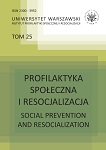Hejterstwo w komunikacji internetowej: charakterystyka zjawiska, przyczyny i sposoby przeciwdziałania.
Hate Acts in Internet Communication: Features, Causes and Preventive Measures.
Author(s): Marta JuzaSubject(s): Social Sciences
Published by: Instytut Profilaktyki Społecznej i Resocjalizacji UW
Keywords: hate; aggression; deviance; Internet; hatred
Summary/Abstract: Hate acts in Internet are a relatively new form of deviant behaviour in Internet public debates. They are marked by the use of insulting language, scornful judgments of various phenomena, an offensive attitude towards co-participants and other individuals, and the expression of aggression and hatred towards them. Such hate acts are limited to Internet, take solely verbal forms, and always target other individuals or groups. Behaviours qualified under the name of hate acts violate commonly accepted informal social norms of courtesy and legal norms established to protect human dignity. They usually contradict netiquettes, i.e. codes of conduct dedicated to Internet as a whole or to specific Internet communication forms. The root causes of Internet hate acts may be found outside the Internet space (e.g. triggers of frustration which next translates into aggressive behaviours on the Internet), and in the very nature of Internet communication which may prompt aggression of participants. Some opinions are voiced that such hate is inspired by the owners of discussion platforms, as hateful comments fuel the debate and boost their income. Others would claim that such hate acts are particularly acute on the Polish-speaking Internet. Such assumptions require further verification. It is highly difficult to counteract Internet hate. In cases which overtly violate rights protected by public legislations, authorities could be requested to act upon. This option is not always available, and if available, not always effective. Explicit definition of codes of conduct for specific segments of Internet communication may be another solution, together with the establishment of bottom-up social control entities (moderators), with ensuing sanctions. It may also be envisaged to introduce control mechanisms exerted by all users of a specific Internet communication segment, and to apply informal sanctions or ignore “haters”; however, such measures are of limited effectiveness. In any case, putting a halt to Internet hate acts is vital, as it touches upon an important mode of public debate, of key importance in democratic societies.
Journal: Profilaktyka Społeczna i Resocjalizacja
- Issue Year: 2015
- Issue No: 25
- Page Range: 27-50
- Page Count: 24

